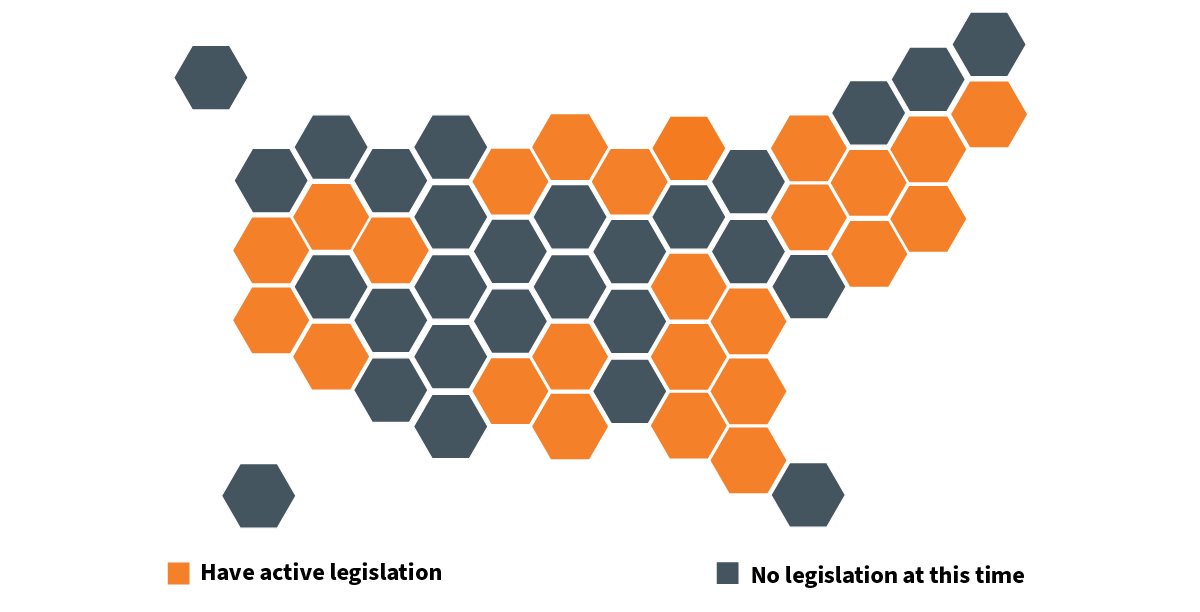Virginia issues guidance for retroactive 2021 PTET election
Virginia issues guidelines on how pass-through entities should file a retroactive election to be taxed at the PTE level in tax year 2021.
On Feb. 19, 2024, Virginia issued Public Document Ruling 24-12, Guidelines for the Retroactive Taxable Year 2021 Pass-through Entity Tax (PTET), subsequently referenced as “guidelines.” The guidelines clarify how a pass-through entity (PTE) should file a retroactive election to be taxed at the PTE level in tax year 2021 (TY 2021).
Background
In 2022, the Virginia General Assembly passed HB1121 and SB692 (Bills), permitting a qualifying pass-through entity (qualifying PTE) to make an annual election (election) to pay income tax at the entity level (PTET), with a corresponding refundable credit (PTET credit) provided to select PTE owners for their portion of the Virginia PTET. The election is available to qualifying PTEs for tax years 2021 through 2025.
Since the Bills were passed in 2022 with retroactive availability to TY 2021, the Virginia Department of Taxation (VDOT) issued Virginia Tax Bulletin No. 22-6 (Apr. 15, 2022) notifying taxpayers not to file/pay under the new elective methodology for TY 2021 at that time pending further guidance to be issued by the agency. These new guidelines provide such guidance.
2021 Retroactive PTET Election
Under the guidelines, a PTE that was “qualified” to make a PTET election in TY 2021 may make that election and file the associated return retroactively. A qualifying PTE is one that had at least one eligible owner during TY 2021 constituting a natural person, estate, or trust (eligible owner).
A qualifying PTE may file the retroactive election by:
- Filing the 2021 Virginia Form 502PTET (return), including all owner credit allocation information
- Making all tax payments prior to, or at the time of, submitting the return
The return and all required payments must be electronically submitted by Sept.16, 2024, using Virginia Business Online Services via the VDOT website.
A qualifying PTE making the 2021 election (electing PTE) must decide how to obtain consent from its owners to make the election because an eligible owner cannot opt out of the election once made by the PTE on their behalf. As these elections can materially impact tax, electing PTEs should obtain and document consent to the election(s) well before finalizing the return. The electing PTE must also notify all owners of the election, whether the owner is eligible or not, and provide all owners a Schedule VK-1 showing their distributive income, and related deductions and credits.
As a general rule, nonresident owners of electing PTE’s are allocated PTET credits based on their Virginia apportioned pro-rata share of PTE liability while resident owners are allocated PTET credits based on 100% share of electing PTE income after state modifications.
If an electing PTE is a Subchapter S Corporation that has both resident and nonresident eligible owners, the electing S Corporation has the option to compute its Virginia taxable income as if all of its owners are nonresidents through a Special Alternative Apportionment election. An eligible owner of an electing PTE that is an S Corporation cannot opt out of the special S-Corporation apportionment election that is provided to such entities. Such an election is not available to elective PTEs that are partnerships or limited liability companies taxed as partnerships.
On the Schedule VK-1s the electing PTE filed with the return, the entity must identify all owners that are eligible for the 2021 PTET credit and the corresponding credit amount. This must be done before the eligible owners can claim the credit on their Virginia income tax returns.
Previously Filed Returns and Payments
Electing PTEs that previously filed a TY 2021 Virginia Form 502, Pass Through Entity Income Tax Return, must claim all nonresident withholding payments on behalf of those eligible owners as a reduction from their share on the PTE’s tax liability due on the return. This will reduce the amount of PTET liability (and available PTET credits) paid on their behalf as that portion of the “credit” has already been received and claimed on their previously filed 2021 Virginia individual income tax returns.
Electing PTEs that previously filed a composite income tax return (Virginia Form 765) for TY 2021 must also subtract any income that was already taxed on the previously filed composite return in determining income subject to tax on the return. This will also reduce the amount of PTET liability (and available PTET credits) to be paid on behalf of those nonresident eligible owners previously taxed on the PTE’s TY 2021 composite return.
In light of these reductions associated with nonresident withholding and composite tax previously taxed, and credits on behalf of nonresident eligible owners, the 2021 election will primarily benefit Virginia resident eligible owners of PTEs with limited relief to such nonresident eligible owners.
2021 PTET Credit
Eligible owners of an electing PTE will receive a credit for the PTET paid on their distributable income. The TY 2021 PTET credit can only be claimed on the eligible owners’ 2023 tax year Virginia individual income tax returns. Furthermore, interest will not accrue on the 2021 PTET credit. While the 2021 PTET credit is reported on each owner’s 2023 Virginia income tax return, it is based on the 2021 taxes of each owner and the electing PTE.
Eligible owners must wait until the electing PTE issues Schedule VK-1s to them before filing their 2023 Virginia income tax return to claim the 2021 PTET credit. If the Schedule VK-1 will be issued after the due date of the eligible owners’ 2023 Virginia income tax return(s), they may request an extension of time to file and make any required extension payments. Alternatively, eligible owners may file their 2023 Virginia income tax return in a timely manner without claiming the 2021 PTET credit, and then amend the return once the Schedule VK-1 showing a 2021 PTET credit is received.
Eligible owners claiming a TY 2021 PTET credit on their 2023 Virginia individual or fiduciary income tax return must make an additional modification for their share of any deduction for state and local income taxes paid or incurred by the PTE during the tax year.
What does CohnReznick think
The VDOT has confirmed that any 2021 PTET due must be paid in full prior to filing the return, and both the return and associated payments must be electronically filed/submitted by Sept. 16, 2024, as no returns or payments will be accepted after that date, nor are there extensions of time to file or late filing options. Taxpayers wishing to file a retroactive return should note this date and plan to obtain consent and notify owners well ahead of time.
Furthermore, it is worth noting that for federal income tax purposes, any Virginia 2021 PTET payment should be deductible in the tax year it is paid, assuming the requirements of Treasury Notice 2020-75 are otherwise satisfied. As such, for calendar year taxpayers this deduction would be reflected on their 2024 income tax return.

Jason Gajramsingh
Contact
Let’s start a conversation about your company’s strategic goals and vision for the future.
Please fill all required fields*
Please verify your information and check to see if all require fields have been filled in.
Related services
Our solutions are tailored to each client’s strategic business drivers, technologies, corporate structure, and culture.
Any advice contained in this communication, including attachments and enclosures, is not intended as a thorough, in-depth analysis of specific issues. Nor is it sufficient to avoid tax-related penalties. This has been prepared for information purposes and general guidance only and does not constitute legal or professional advice. You should not act upon the information contained in this publication without obtaining specific professional advice specific to, among other things, your individual facts, circumstances and jurisdiction. No representation or warranty (express or implied) is made as to the accuracy or completeness of the information contained in this publication, and CohnReznick, its partners, employees and agents accept no liability, and disclaim all responsibility, for the consequences of you or anyone else acting, or refraining to act, in reliance on the information contained in this publication or for any decision based on it.















